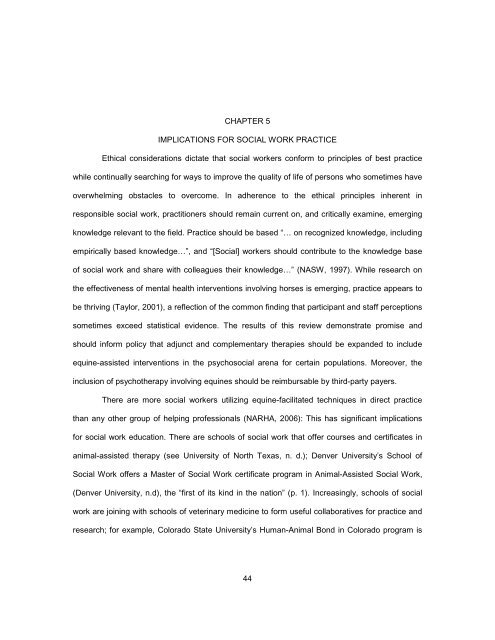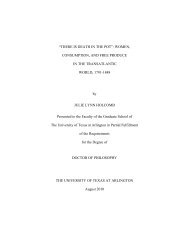A SYSTEMATIC REVIEW OF THE EFFECTS OF PSYCHOTHERAPY ...
A SYSTEMATIC REVIEW OF THE EFFECTS OF PSYCHOTHERAPY ...
A SYSTEMATIC REVIEW OF THE EFFECTS OF PSYCHOTHERAPY ...
You also want an ePaper? Increase the reach of your titles
YUMPU automatically turns print PDFs into web optimized ePapers that Google loves.
CHAPTER 5<br />
IMPLICATIONS FOR SOCIAL WORK PRACTICE<br />
Ethical considerations dictate that social workers conform to principles of best practice<br />
while continually searching for ways to improve the quality of life of persons who sometimes have<br />
overwhelming obstacles to overcome. In adherence to the ethical principles inherent in<br />
responsible social work, practitioners should remain current on, and critically examine, emerging<br />
knowledge relevant to the field. Practice should be based “… on recognized knowledge, including<br />
empirically based knowledge…”, and “[Social] workers should contribute to the knowledge base<br />
of social work and share with colleagues their knowledge…” (NASW, 1997). While research on<br />
the effectiveness of mental health interventions involving horses is emerging, practice appears to<br />
be thriving (Taylor, 2001), a reflection of the common finding that participant and staff perceptions<br />
sometimes exceed statistical evidence. The results of this review demonstrate promise and<br />
should inform policy that adjunct and complementary therapies should be expanded to include<br />
equine-assisted interventions in the psychosocial arena for certain populations. Moreover, the<br />
inclusion of psychotherapy involving equines should be reimbursable by third-party payers.<br />
There are more social workers utilizing equine-facilitated techniques in direct practice<br />
than any other group of helping professionals (NARHA, 2006): This has significant implications<br />
for social work education. There are schools of social work that offer courses and certificates in<br />
animal-assisted therapy (see University of North Texas, n. d.); Denver University’s School of<br />
Social Work offers a Master of Social Work certificate program in Animal-Assisted Social Work,<br />
(Denver University, n.d), the “first of its kind in the nation” (p. 1). Increasingly, schools of social<br />
work are joining with schools of veterinary medicine to form useful collaboratives for practice and<br />
research; for example, Colorado State University’s Human-Animal Bond in Colorado program is<br />
44
















